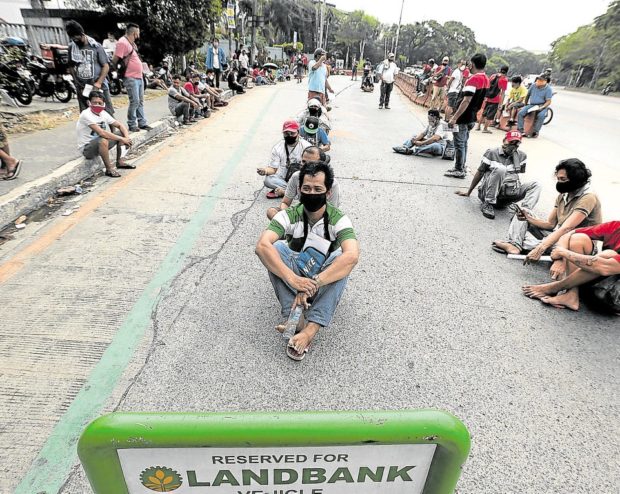
AID Recipients of government subsidy, amid a pandemic that has forced a lockdown in Luzon and other parts of the country, await their turn outside a state-run bank in Quezon City. —GRIG C. MONTEGRANDE
MANILA, Philippine — Middle-class families will unlikely receive cash subsidy from the government similar to what 18 million poor families will be getting for two months amid the enhanced community quarantine in Luzon and other parts of the country, Finance Secretary Carlos G. Dominguez III said on Monday.
Asked by CNN Philippines if the middle class would be given money, Dominguez replied: “I doubt it at this point … because we define middle class as those people who have regular jobs.”
The government is putting priority on providing relief to vulnerable sectors, including workers, up to 1.2 million of whom could temporarily lose their jobs amid the pandemic, he said.
The finance chief reiterated that those belonging to the middle class were already benefiting from loan moratorium, extension of tax filing and payment deadlines, and funds recently released into the financial system after the Bangko Sentral ng Pilipinas cut bank reserves and interest rates.
“The Bayanihan to Heal as One Act addressed the middle class’ concerns, first by requiring banks not to collect loans immediately, by giving them a period to delay the payment of amortization, by not allowing banks to charge interest on interest,” he said.
Housing, credit card loan relief
Dominguez said these were designed primarily for members of the middle class with housing and credit card loans. “[S]o the middle class has been assisted in that fashion.”
Last week, President Duterte said he supported the proposal of Cavite Gov. Jonvic Remulla to help middle-class families who were using the little savings they had and were hurting because of the lockdown.
Albay Rep. Joey Salceda also proposed to the President to grant a universal basic income of P1,000 to all Filipinos, except the wealthiest 10 percent.Salceda said the universal basic income would be in lieu of the second installment of the P5,000 to P8,000 assistance per month to poor families.
Aid to MSMEs, workers
Dominguez said registered micro, small and medium enterprises (MSMEs) would be provided with loan guarantees, while their workers would receive wage subsidies during the lockdown.
He said the loan guarantee program for MSMEs and the parallel assistance to their employees amounting to P35 billion and P51 billion would be formally announced on Tuesday.
About 3.5 million people would get the cash support for MSMEs and their workforce, he told CNN Philippines.
But Revenue Deputy Commissioner Arnel S.D. Guballa told the Inquirer that only small businesses registered with the Bureau of Internal Revenue (BIR) and compliant with tax payments of their employees would be qualified to receive the wage subsidies.
The BIR and the state-run pension fund Social Security System (SSS), which oversees the welfare and benefits of private sector employees, were still crafting the small business wage subsidy program to be implemented nationwide, Guballa said.
Registered with BIR, SSS
Dominguez explained that the government could assist only companies registered with the BIR and the SSS, or those that belong to the formal sector.
“We have no way of identifying those who are not [in our system],” he said.
These programs for MSMEs, according to him, also formed part of the government’s assistance to the middle class.
Referring to the program for MSMEs mentioned by Dominguez, Speaker Alan Peter Cayetano said the country’s economic managers were preparing “quite a big amount” to help the middle class.
“So for the next stimulus package … they’re preparing quite a big amount for two targets: micro-small-medium enterprises and those under SSS, so the assistance shall go directly to them,” Cayetano told reporters during Monday’s inspection of the Rizal Memorial Stadium in Manila as a new quarantine center.